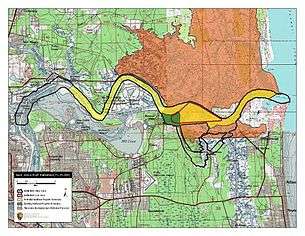Battle of St. Johns Bluff
| Battle of Saint John's Bluff | |||||||
|---|---|---|---|---|---|---|---|
| Part of the American Civil War | |||||||
 St. Johns Bluff around 1900. | |||||||
| |||||||
| Belligerents | |||||||
|
|
| ||||||
| Commanders and leaders | |||||||
| John Milton Brannan | Charles F. Hopkins | ||||||
| Strength | |||||||
| 1,573[1] |
1 artillery battery 1 cavalry company | ||||||
| Casualties and losses | |||||||
| None | None | ||||||
The Battle of St. John's Bluff was fought from October 1–3, 1862, between Union and Confederate forces in Duval County, Florida, during the American Civil War. The battle resulted in a significant Union victory, helping secure their control of the Jacksonville area.[2]
History

The St. Johns River was important in the Union effort of taking Florida. If Federals controlled the St. Johns River then they could raid Confederate positions in the interior of Florida and also use the river as a barrier for control of the east. The Union wanted to control North Florida and use it as a haven for escaped slaves and use its position to initiate Reconstruction for Florida. Federals first occupied Jacksonville in March 1862. Federal gunboats stationed at Mayport Mills operated up and down the river.
Early in the war, in order to stop the movement of Union Navy ships up the St. Johns River, Confederate Brigadier General Joseph Finnegan established an artillery battery on St. Johns Bluff, on the south side of the river 18 miles downstream from Jacksonville, Florida. The Union victories at Fort Donelson and Fort Henry forced Florida Confederates to go to Tennessee to reinforce the Confederate Army. With few resources Finnegan managed to fortify St. Johns Bluff where Confederate troops used slave labor to construct defenses.[3] This was part of a series of Confederate defensive works that had been constructed near Fort Caroline and Yellow Bluff Fort.
On September 11 Confederates opened fire on Union gunboat USS Uncas approaching the bluff. The USS Patroon joined the USS Uncas and opened fire on the bluff but failed to destroy the Confederate position. The Union dispatched over 800 soldiers to Florida from South Carolina to take the bluff expecting it to be a challenging obstacle. Union reinforcements arrived on October 1 at Mayport Mills. The next day, Union soldiers under Brigadier General J.M. Brannon approached the bluff from the rear. Confederate Colonel Charles F. Hopkins was in a panic due to the Union reinforcements approaching from the rear and the Union gunboats still firing on the bluff. Captain Winston Stephens believed the Confederate position could hold off the Federal assault. However, Hopkins decided to order a retreat from the Confederate position on October 2–3. Federals occupied the Confederate position and seized the cannons. Two days later on October 5 the Federals moved on to nearby Yellow Bluff Fort which had also retreated.[4]

Brigadier General Joseph Finnegan
Confederate Captain Winston Stephens
Brigadier General John M. Brannan
Aftermath
Jacksonville was reoccupied on October 3 after the Union victory at St. Johns Bluff. Finnegan believed that Hopkins' retreat from St. Johns Bluff was a "gross military blunder" but Hopkins still defended his position for retreating. The Confederate threat in North Florida no longer prevented Federals from seizing the St. Johns River and Jacksonville.[5][6]
See also
References
- ↑ National Park Service Battle Summary
- ↑ "St. John's Bluff". ehistory.osu.edu. Retrieved 14 May 2016.
- ↑ "The River War: The Timucuan Preserve in the Civil War" (PDF). National Park Service. U. S. Department of the Interior. Retrieved 30 January 2015.
- ↑ "Defender of the St. Johns River". Explore Southern History. Retrieved 14 May 2016.
- ↑ "The Battle of St. Johns Bluff - Jacksonville, Florida". Explore Southern History. Retrieved 14 May 2016.
- ↑ "Tag Archives: St. Johns Bluff". Florida Memory. Retrieved 14 May 2016.
External links
- Fort Caroline National Memorial - official National Park Service website